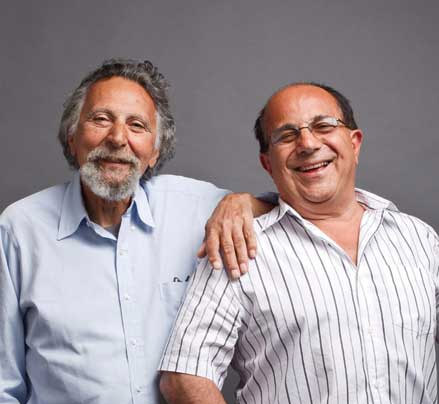The Big Q | Click and Clack from Car Talk
In 2010, we asked Tom and Ray Magliozzi, NPR’s popular “Click & Clack, the Tappet Brothers”… After all these years, how do you keep yourselves inspired?

Coffee By Design | Portland, Maine
Photo Credit : Katherine Keenan
Photo Credit : Grow, Jason
Tom and Ray Magliozzi’s Car Talk originated on WBUR in Boston in 1977, attracting a large local following before premiering in National Public Radio syndication in 1987. Car Talk is now heard by more than 4.3 million listeners each week. The Magliozzis also write a nationally syndicated newspaper column, “Click and Clack Talk Cars.” Their most recent book is Ask Click and Clack: Answers From Car Talk.
Ray: We’ve been fortunate to have very interesting callers. They’ve sustained us. If it weren’t for the callers, we would have quit after the first couple of shows. I certainly didn’t want to sit there and talk to him [gestures toward Tom] for an hour every week.
Tom: Hell, no!
Ray: As a matter of fact, for the very first show Tom was supposed to be part of a panel of car experts. The host was supposed to ask questions, but no one else showed up, so Tom asked if he could take calls from listeners. That’s how the show was born. It was that simple, that serendipitous. The next week I came. Somehow the host got dumped, and it was just us from that point on.
Tom: Yeah, thank God we were able to take calls! [Laughter.]
Ray: For at least the first six months, we thought that [WBUR] was a studio just for BU [Boston University] students. Then we started getting calls from places like Framingham. [Laughter.] Remember, this was the seventies. Public radio was still in its infancy. I was listening to Gordon Lightfoot. I discovered him at the Harvard Coop, looking through the folk-music section. Great album cover; he’s sitting there with his guitar, kind of stretched out, with cowboy boots and a leather vest. I didn’t know any of the songs, but I bought the record. It was $1.19. I still have it. Now there’s probably no place to buy a record in Harvard Square.
Tom: Third floor of The Garage [the Cambridge shopping arcade].
Ray: Oh, that’s right. Anyway, the callers are the most important part of our show. Often we can zero in on something interesting. Some people are very open, they’ll divulge something right off–“Hi, I’m a microbiologist”–and we can explore that. [Laughter.]
The topic that probably comes up most is relationship disputes: “My husband insists on burping the car when he puts gas in it.” The guy thinks that if he pushes the car up and down as he’s adding gas, he can squeeze in another couple of gallons. The woman asks, “Is this what he should be doing?” There’s always some kind of wager riding on it.
I will say we’ve had more fun with the women callers over the years than with the guys. The women have no inhibitions. They’re not expected to know anything about cars, so they’re not restrained in what they say. Guys think they’re supposed to know stuff, and they can be kind of quiet sometimes.
The better calls are generally the ones where there’s no expectation of the caller’s knowing anything. It’s fun to kind of draw the information out of the caller. And the women aren’t afraid to look foolish. They’ll make noises; it’s always good when you can get someone to make the noise the car is making. There’s no question that when we first started doing it, all the questions were from guys, and we weren’t having any fun. Now we are.
Tom: Back then, they were all doing stuff to their own cars.
Ray: Right, that’s the way things were. The garage we had then [Hacker’s Haven] originally started off as do-it-yourself. Tom and I had envisioned that we’d stand there in white lab coats, rocking back and forth on our heels, nodding approval or shaking our heads: “No, no, no, don’t tighten that bolt too much or you’ll break it off.” We thought we could run the operation from afar. Our biggest challenge was going to be how we’d wheel out the wheelbarrows full of money. [Laughter.] What a great idea, right? These people come in; we give them a little warmth, some electric light so they can see, some expertise. We don’t get our hands dirty. They do the work, and they pay us.
Tom: It was a big place. And cheap, because it was a dump. It’s not there anymore because they tore it down. [Laughter.]
Ray: It was condemned by the city. [The garage is now in a new location.] After a while we realized a couple of things: Number one, we weren’t going to get rich; number two, we couldn’t wear the lab coats because it turned out we had to help. I mean, we had some great customers, but we also seemed to be a magnet for every nincompoop, misfit, and moron in town. They seemed to think that being under our roof would give them some kind of knowledge. They would come in, and even if they didn’t have this knowledge, they thought it would be imparted to them by us, or if they screwed up that we would be there to fix it.
We never left before 11:00 at night. There was not one night I got home and caught Johnny Carson’s monologue, and that came on at 11:30. I was so tired when I got home that I couldn’t even take my clothes off. My wife wouldn’t let me sit anywhere. I had to sit on a plastic thing on the living-room floor, and I’d fall asleep there. I’d wake up in the middle of the night, disrobe, and take a shower before getting ready to do the whole thing over again. We killed ourselves, but we laughed our butts off.
Tom: Remember the guy who jacked up his Lincoln Town Car from the oil pan? There was oil everywhere. [Laughter.]
Ray: Gradually the garage evolved into a regular repair shop. And the show kind of evolved too, because the original shows were all guys in their driveways who were taking something apart and they couldn’t get it back together. We’d walk them through it step by step. It was great for that one person; it was boring for everyone else. And it was boring for us.
Then women began to call, and fewer do-it-yourselfers. We still get those other kinds of calls. Now they call the shop [the Good News Garage]. Somehow they find out that I’m still there three days a week. If they call and I’m not there, the guys say, “Oh, Ray will be in on Thursday. Call back then.” So I get the droners: “I got a ’68 Dodge Diplomat, slant-six, and the number-five spark plug keeps blowing out.” [Laughter.]
A lot of times people call in [with an automotive question] and they really want to talk about something else. Today there was the girl who asked about giving a cat a tranquilizer. She and her husband were driving from the Berkshires to Boulder, Colorado. He was going to drive a U-Haul and tow her car. She was going to drive his car with their two cats. She wanted to know if there were any tranquilizers we could suggest for the cats because she thought the trip would be hard on them. Over the years we’ve often ventured into areas about which we know nothing.
Tom: When someone asks a question, we have to give an answer!
Ray: Right. Women can say, “Well, I don’t know,” but men have to give answers. It’s male answer syndrome. One time a guy called in about electric brakes on a cattle trailer. I didn’t even know what a cattle trailer was.
Tom: We didn’t know what electric brakes were!
Ray: But we gave him an answer. And then a week or two later we got a letter from a guy named Andy–that was the only way he identified himself. He wrote a very articulate letter about how it’s possible for two people to know less about a topic than one person. [Laughter.]
Tom: If one person were fielding that question, he just would have said, “I don’t know.”
Ray: But while [Tom] is asking the caller, “How heavy is the trailer, and how many cows are you going to put in it?” I’m thinking, How could they possibly work, electric brakes? And then you start formulating some BS.
Tom: I still don’t know what electric brakes are. Do you?
Ray: I still don’t know what a cattle trailer is! [Laughter.] People who call from rural areas definitely have a different take on things. They tend to be more self-reliant and resourceful. It’s not unusual to find them still fixing their own cars. Remember that guy Dave from Bemidji?
Tom: [Laughs.] He was really funny.
Ray: He told us this whole story about how he drove his old Chevrolet from Minnesota to Alaska. The car had 350,000 miles on it, and he’d made a major repair using a barbeque grill. He wanted to know if he should drive the car home. We told him, “Go for it.”
Some of our best calls are from people who are trying to go on some kind of adventure and need encouragement. A lot of people lead predictable lives and don’t take any risks. But if you don’t, then you won’t have any stories to tell your kids. You don’t want to do something that’s going to end your life, but it’s good to do stuff where things can go wrong. If something happens, and it creates an adventure, you’ll remember it forever.
I remember one guy who was going to take a trip with his father and brother. They were going to drive some old Dodge Dart or some other old clunker. Doug [Berman, the producer] was in our headphones suggesting that we tell these guys to rent a newer car. I said no. The best thing that can happen is you break down every hundred miles and you get into arguments and everything goes wrong. It’ll be the greatest trip you ever took.





I worked with Yom at the time he left to join Ray at the garage. He was always fun to be around. I would have never guessed he would become famous.